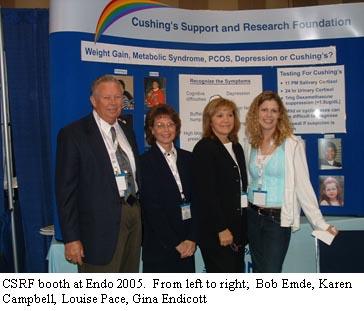For the 9th consecutive year, the CSRF exhibited at the Endocrine Society’s annual meeting. Endo 2005 was held in San Diego, CA in June. This meeting draws approximately 6000 attendees, primarily endocrinologists and includes exhibits and technical sessions where the latest information is presented. Our goal at this meeting is to distribute literature to as many endocrinologists as possible to increase the awareness of Cushing’s. Our booth art reflected the need to consider the diagnosis of Cushing’s when evaluating more common disorders. We handed out newsletters, brochures, and discussed the need for adequate screening testing. There continues to be high interest in the nighttime salivary cortisol test, particularly now that it is FDA approved.
Thanks to the efforts of Bob Emde, we also had a patient dinner that was attended by all of us above, plus Alicia Bellantoni and her husband, Mary Card, Tricia Harrell and her husband, and Kristi Kantrud. Almost all of us continue to agree that actually meeting someone else who had Cushing’s is an experience we never forget. We all have so much in common and so much to talk about. This year, we were particularly pleased that Dr. David Schteingart from the University of Michigan, also joined us. These meetings can only happen through the efforts of local people. Thank you so very much Bob (and thanks for helping set up the booth)!
In the technical sessions, we were pleased to see that Cushing’s was discussed in “Meet the Professor” sessions, a Symposium and an Oral Session, as well as in a variety of posters. It is impossible to summarize all of the excellent work presented, but some highlights follow.
In the smaller, interactive, “Meet the Professors” sessions Dr. Constantine Stratakis (NIH, Bethesda, MD) presented on Pediatric Cushing’s and adult Cushing’s was covered in two other sessions, one by John Newell-Price (University of Sheffield, UK) and a second by Dr. Lynnette Nieman (NIH). During a very interesting session on Pituitary Surgery, Dr. Brooke Swearingen (Mass. General Hospital) presented data that showed that a very large percentage of transsphenoidal surgeries done in the US continue to be done by surgeons by surgeons who do very few procedures per year.
In the Symposium on Cushing’s, Dr. Xavier Bertagna (Hosp. Cochin, Paris, France) discussed “New Strategies for Diagnosis” which included nighttime salivary cortisol measurements, the desmopressin test, and petrosal sinsus sampling using CRH and desmopressin. Dr. Martin Savage (St. Bartholomew’s, London, England) presented their experience with 44 pediatric cases of Cushing’s. Dr. Lynnette Nieman (NIH) spoke on “New Medical Therapies” for Cushing’s and discussed the need for medical treatments to effectively reduce ACTH secretion in cases of failed pituitary surgery and ectopic tumors. Advances in the understanding of what controls ACTH production at a genetic level can lend guidance for identifying potential drug targets.
In the area of drug treatment of Cushing’s, a poster by Dr. Boscaro (Univ. of Ancova, Ancova, Italy) et al reported some preliminary findings for the use of SOM 230. This investigational drug is currently under study for Cushing’s at multiple centers (see the Clinical Study notice in this newsletter). Eight patients were treated with SOM 230 and cortisol decreased to some degree in all patients and normalized in 1 patient. Further studies are needed.
In the Oral Session on Cushing’s, Dr. John Lindsay (NIH, Bethesda, MD) reported on quality of life and Cushing’s. The primary conclusion was that “Active Cushing’s is associated with significantly impaired Health-Related Quality of Life (HRQOL), which improves early following remission. However, despite long-term remission, HRQOL remains low compared to the normal population.” Also in this session, Dr. Mary Lee Vance (Univ. of Virginia, Charlottesville, VA) reported relapse following gamma knife radiation in about 20% of cases. Dr. Karen Mullan (Royal Group Hosp., Belfast, UK) reported that rosiglitazone was not successful in lowering ACTH levels in a small study of patients with Nelson’s Syndrome. In another session, Dr. Stavroula Christopoulos (Hotel Dieu, University of Monreal, Montreal, Canada) presented on the neuropshychological function of 16 patients during and following Cushing’s. Visual and memory function improvements can be observed at 12 months and continued to 24 months. Depression improvement was observed at 12 months, but improvement in executive functioning was not observed until 36 months.
There were also many excellent posters: “Predictors of Diabetes Insipidus After Transsphenoidal Surgery” (Janes, et al, Univ. of Virginia), “MRI Imaging of Pituitary Tumors” (Chowdhury, et al, NIH), “Adjuvant Mitotane Treatment in Adrenocortical Carcinoma” (Terzolo, et al Univ. of Torino, Italy), “Circadian Rhythm of Cortisol Secretion and Depression” (Starkman, Univ. of Mich.), “Screening of Obese Diabetes” (Findling, et al, St. Luke’s Medical Center, Milwaukee, WI), “Performance of Screening Tests” (Baid, et al, NIH), and many others covering ectopic ACTH secreting tumors, the genetics of adrenal and pituitary tumors and numerous case studies.
You can check the abstracts yourself, through The Endocrine Society web site at http://www.endo-society.org. Select View the Abstracts under Endo 2005. You will have to register.





Sorry, comments are closed for this post.